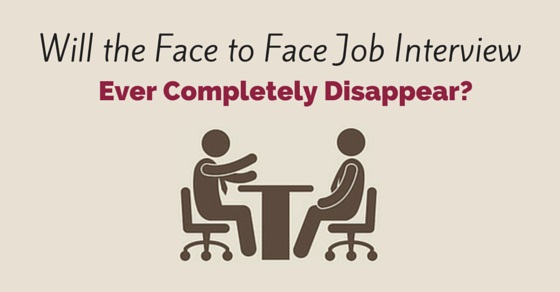We have all suffered the apprehension which comes with attending an interview and in turn many of us have sat on the other side of the desk and spent long days meeting a whole host of potential candidates. There is no doubt the interview process can be a tiring one for both sides, however it can also be a valuable experience.
 The Pros and Cons of Face to Face Interview:
The Pros and Cons of Face to Face Interview:
For the recruiter, there are many benefits of meeting candidates face to face. First, body language is a big part of the decision-making process and it’s often easier to gauge someone’s reactions when they are directly in front of you. Second, if you regularly undertake panel interviews or you want to see how the candidate interacts with other members of staff, it’s usually more time and cost effective to invite applicants to your office.
For the candidate too there are benefits of meeting face to face. Overall it’s an easier way for them to see what the working environment is like and to get a better feel for who their future colleagues might be.
However, face-to-face interviews take a great deal of organisation and if space is limited in your office the logistics of finding and booking an interview room can be difficult. For the candidate too, on-site interviews can prove problematic. Many people now commute long distances to work and thus the applicant usually has to bear the expense of travel to the interview. They will also have to book at least half a day’s holiday, if not a whole day, from their current job to attend. If they are applying for multiple jobs, this can prove expensive and time consuming.
There are also additional logistics involved if you are booking interviews with people from overseas or those who will be teleworkers. The question then arises whether it is really fair to ask them to travel to an interview when they may not even be successful. If you do decide to go ahead with an on-site meeting, who will pay the often considerable expenses, the business or the candidate?
Can Video Conferencing Work for Interviews:
If you want to avoid face to face interviews, what is the alternative? In recent years the availability of VoIP has made it much easier and more cost effective to video conference with people in the UK and internationally. This has had a knock on effect for recruitment and video conferencing is now seen as a viable way to undertake interviews. In fact it’s ideal for the interview process as you can see the candidate and therefore use all the visual cues we take for granted in a face-to-face meeting.
In addition, the screen share capability of VoIP also allows for skill-set and psychometric testing to take place over the internet. To overcome the problem of the candidate not knowing enough about the potential employer, some companies have even created visual tours of their offices which offer applicants a direct view of where they will work.
Many start-up companies or small businesses work from virtual offices or co-working spaces, therefore it can prove difficult logistically when they need to interview new hires. Again, this is where video conferencing proves so advantageous. There is now no need to look for interview rooms or to meet in hotels or coffee shops, which might not have the resources you need.
For the candidate there are just as many benefits to a virtual interview: lower costs; less travel time; a more relaxed environment; and reduced time off from their current employment.
Is This The End of Face to Face Interviews?
In our increasingly globalised society where employers might need to interview candidates for their offices overseas, homeworkers or even freelance staff, virtual interviews can be a great solution. It’s probably not going to lead to the total demise of face-to-face interviews because for many companies they still offer the best solution, especially if candidates are local or need to be met in person. However virtual interviews can drastically reduce the time-to-hire as first interviews can be carried out online and then only the final shortlisted candidates called in for face-to- face meetings.
The ability to interview candidates virtually is a great step forward for many businesses and as the need to employ off-shore and freelance candidates grows, this type of interview will definitely be something we all experience more frequently in the future.
Author Bio: This is a Guest post by Helen Wallis




































